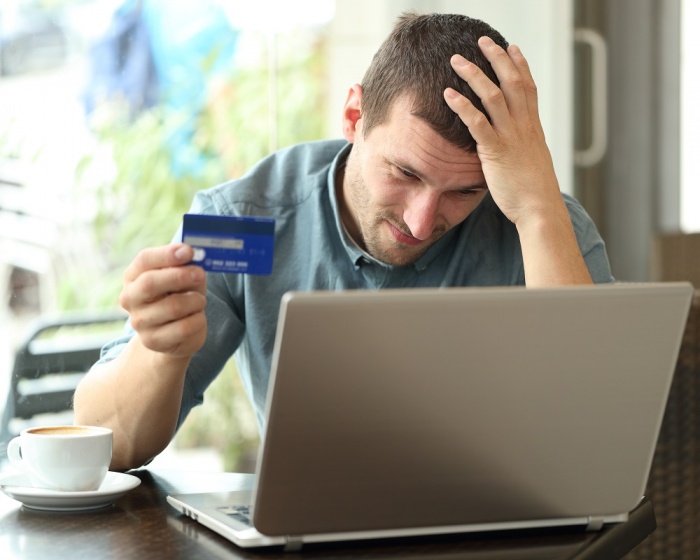Many credit cards come with credit limits attached, which is the top amount that you’re allowed to put on your card. When you reach that limit, your credit card is considered to be maxed out.
If you have maxed out your card, it can have a major impact on your financial situation. Fortunately, there are a few options available to help with a maxed out credit card.
What It Means When To Have A Maxed Out Credit Card
First, let’s look at what it truly means to have a maxed out credit card.
Suppose, for example, that your credit card comes with a limit of $15,000. If you keep putting purchases on your card to the point where it reaches that limit, your card is maxed out. In some cases, you might even exceed your credit limit.
It’s worth noting that the credit limit isn’t intended to ever be reached. That means if you do reach the limit, your card’s issuer may consider it a red flag and take steps accordingly. This is especially true if you tend to run your credit card balance up regularly without paying it off.
Impact Of A Maxed Out Credit Card
A maxed out card can impact you in several ways. Namely, it can lower your credit score, incur a penalty APR, and even lead to a closed out account.
Lower credit score
First of all, you can expect to take a hit to your credit score. When you max out your card, your credit utilization ratio becomes 100% on that card.
That ratio is one of the major factors used in determining your credit score, and if it’s anywhere above 30%, it’s likely to cause a drop. Naturally, credit utilization at 100% is going to have a significant impact.
Penalty APR
In addition to reporting your high credit utilization to credit bureaus, your card issuer might also charge a penalty APR. A penalty APR is an increase in your interest rate, usually to the maximum amount allowed (right around 30%).
That means if you had a fairly low-interest rate before, you’d suddenly have a much higher one. On the other hand, if your interest rate was already fairly high, the increase isn’t too much, but it will still cost you in the long run.
A penalty APR can endure on your account indefinitely, but they typically last for a minimum of six months.
Closed account
Finally, in extreme cases, your issuer may close your account altogether. That means you are no longer able to use your card for purchases, and it can also affect your credit score further. You’ll still be held responsible for paying the debt, however.
It’s fairly rare to have your account deactivated, but if it is, it’s often because you maxed out your card without paying off the balance.
What to Do When Your Credit Card Is Maxed Out
If your card has been maxed out, there are a few things you can do to tackle the situation. These are fairly straightforward, but may be difficult to manage depending on your financial circumstances.
Pay down the balance
The ideal way to handle a maxed out credit card is to pay down the balance. If you can, pay off the whole amount. Otherwise, just pay what you can. Making a good-faith effort can prevent getting your account closed off, and it will reduce the interest you have to pay in the long run.
In some cases, paying off your credit card may require you to reassess your financial priorities and rebalance your budget. It can be difficult, but it will help the most in the long run.
Request a credit limit increase
Another option is far from ideal but may be possible in certain circumstances. If you don’t tend to make regular payments on your balance or have a low credit score, it’s likely to be denied. On the other hand, if you have strong credit and are generally responsible for payments, you stand a higher chance of having the request accepted.
Take note, however, that some credit card companies charge a fee to increase your limit.
Transfer the balance
A final way to deal with a maxed out card is to transfer the balance to a new card. If you have good credit, you might be able to get a card with a 0% introductory rate, which will make paying off the balance much easier than you would with a penalty APR.
This tactic typically works best if you have good credit and are otherwise responsible for your card. Otherwise, it may not be available as an option.
Credit counseling
If you aren’t able to pay down your debt in any meaningful way and have poor credit, a credit counseling service may be the way to go. These services will negotiate with your card issuers, lump all of your payments into one amount, and often net you a lower interest rate.
However, you’ll likely have to cancel all but one of your cards. In addition, be careful which company you choose—some aren’t trustworthy.
How To Avoid Maxing Out A Credit Card
Once you’ve paid down your balance and resolved the issue of having a maxed out credit card, you’ll want to take steps to prevent that from happening again in the future. Some ideas include:
- Using your credit card sparingly
- Setting up alerts for when your card’s balance reaches 10% to 30%
- Cancel out all cards except for one
- Be financially responsible
Generally being wise with your money and spending less than you earn will help you avoid maxing out your credit cards in the future.

